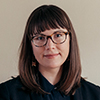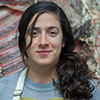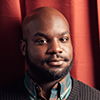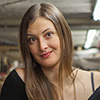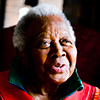



Meriem Bahri, 31, grew up in France and Tunisia, and earned a PhD in biology at the Lille University of Science and Technology. But when she moved to Chicago in 2011, she reinvented herself as what she'd always wanted to be—a theatrical costume designer, with a specialty in thoroughly researched historical garb. She's created exquisite period costumes for every production of the Haymarket Opera Company.
Interview by Deanna Isaacs
Photographs by John Sturdy

Since I was a kid, I always wanted to do something artistic. But my parents are scientists. They told me I should keep my artistic things for hobbies, and find a real job in science, because that will pay the bills.
My parents are Tunisian and French. Tunisia was a French protectorate, and my great-grandmother was a seamstress in Paris. My great-grandfather, who was Tunisian, was studying in Paris. They met under the Eiffel Tower in the 1930s and got married.
I had a choice between mathematics, physics, and biology. I was a little bit rebellious, because I chose biology, while my parents love mathematics and physics. When your parents are PhDs, there is no way I could do less. After I got the PhD, I moved to Chicago. It was almost four years ago.

I followed my husband, who had a postdoc at the University of Chicago. He’s a biologist too. We did our studies in the same building. I met him at a music festival on campus. We got married in 2010, just before moving to the U.S. He’s a researcher in the Department of Evolution & Ecology.
Officially, I was looking for a postdoc too, but I was hoping to do something completely different. During my PhD, I was working every day in a laboratory, and I realized that was not what I wanted to do for all my life. So when I had the occasion, I just switched, and I switched definitively.
Since I was a kid, I was always very interested in fabric and drawing. For years, I wanted to be a fashion designer. During my PhD I started to dance with an amateur group in Lille. We had a couturiere making the costumes. She asked me to help her. I never touched a sewing machine before, so I was a bit afraid of it. She said, “Everything is set up, you just have to press on the pedal and stitch straight.” I really loved it.


I thought the sewing machine was a very interesting tool. I had already sewn a costume for myself for one of the performances. But I had done everything by hand. I didn’t know the rules of sewing. So when I discovered the sewing machine, I thought, Oh, that’s a way to do things faster, and maybe better.
I took a few classes to learn how to work with a sewing machine. After the classes I bought my own machine, and since then I was, like, every evening, every weekend, trying to sew something. I was working during the day for my PhD, but in the evenings and on the weekends I was just practicing. This is how I learned patterning. For me, it’s more or less like geometry.

I was interested in working in the couture field, but when I came to Chicago, I knew absolutely no one, and my English was not very good. At that time I was living in Lakeview, and I went to a knitting club in my neighborhood, and there I met a girl. She asked me, “What are you looking for?” And I said I wanted to do something in costumes, and it happened that she was a soprano, and she knew a musician who was just opening his own opera company. And she told me, “You should contact him, because he’s looking for people. Maybe he’ll be interested by someone who can sew costumes.” He was [Haymarket Opera founder] Craig Trompeter, and this is how I started with the Haymarket Opera Company.
I’ve done all of the Haymarket shows since 2011. The first was Aci, Galatea e Polifemo by Handel [written in 1708]. I didn’t know the opera, but I loved history, and I already had historical clothing books. I was extremely happy that the first chance I had to do costume was historical. I love to be a historical detective.
I made all the costumes, for every show. The October show this year was the first time I delegated the sewing [to a costume shop]. Sewing all the costumes took a lot of time. That’s why I’m very happy now; I can do more design work. Besides Haymarket, I’m working now as an assistant for the costume designer for Boston Early Music Festival.

And I also presented ballet with Elements Contemporary Ballet in November, here in Chicago. It was The Sun King, an original creation by the codirector Joseph Caruana, and it’s the story of the relationship between Louis XIV of France and his main musician. It’s the 17th century. So it’s contemporary dance but there are Baroque touches in the costumes.
With the delegating, I am still very involved. Besides the design, I’m giving them documents, writing descriptions, I’m there for every fitting, I discuss with the draper. Despite that, I realize there is always a window for interpretation. The first time you work with a director, the first time you work with a company, you have to adjust.
The hardest part is to see the show at the end, because I’m very perfectionist. I’m always a bit disappointed. The first dress rehearsal I’m relieved that everything went well. No big catastrophe, you know? And when I’m done with a show, I don’t even really like looking through the photos. I’m really done with it, and I’m already thinking to the next one, because I’m never 100 percent satisfied. But I’m always very excited at the beginning.
I’m applying for a green card. I cannot say where I’ll be in five years. There’s a possibility we’ll go back to Europe. But for the moment we love the city. There’s so much culture. It’s great to be here and have this opportunity for a change of career.




